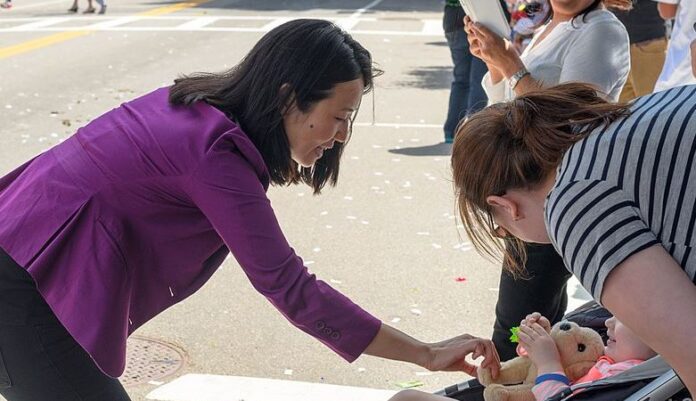Photo by Dale Cruse via Wikimedia Creative Commons
Asian Americans in Massachusetts are exposed to air that is on average 26% more concentrated with a polluting particulate matter than the state average, with other groups of color displaying similar trends.
Boston City Councilor Michelle Wu wants to change this statistic, The Huffington Post reports.
Earlier this week, the Taiwanese American official published an ambitious plan to adopt a Green New Deal for New England’s biggest city, combining her existing agenda with sweeping COVID-19 recovery and community enrichment projects focused on climate justice.
The 43-page manifesto calls climate justice “racial and economic justice,” citing that collective action can transform a city’s capacity to reduce pollution side-by-side with racial equity.
“Envision a city where all residents enjoy healthy homes, fresh food, clean air and water, and beautiful public spaces,” the document stated. “A transformed city, where poverty, pollution, social and environmental injustices, and racial oppression are becoming stories from the past.”
Boston indeed has a lot of work to do to get there. In 2018, the Brookings Institution found the northeastern city had the 7th highest income inequality gap among big American cities. The Boston Globe reported in 2017 that the median income of non-immigrant Black households was in the Boston area was $8.
Wu’s report calls for a justice audit of the city’s government structure, formation of an “urban climate corps” and the creation of more green jobs.
Her plan is inspired by proposals from cities like Los Angeles and Minneapolis to provide green spaces to underserved and segregated communities, The Huffington Post reported. It also looks beyond the United States in borrowing clean electricity mandates from cities such as Munich, Germany, and Vancouver, Canada.
“The pandemic was a shock, and changed so much of our daily lives, and yet it revealed how deep the roots of inequity and structural racism extend,” Wu told StreetsBlog Mass. “The climate crisis and our current public health crises are intertwined, and wrapped in a political system that relies on structural racism and injustice. We need to tackle all of these problems together in this moment: climate justice is racial and economic justice, and cities can lead the charge.”
On top of supporting popular proposals such as making the Boston area’s public transportation free, Wu told StreetsBlog Mass that she wants to start a broader conversation about local systematic change.
“The conversation about how to do this must be community-led, and grounded in leadership from the grassroots up. The goal is to start mobilizing people with a conversation that’s intersectional and aspirational,” Wu said. “If we’re serious about solving these problems, the scale of action we need is only possible if we’re talking about these interlocking crises together.”
Wu’s agenda also coincides with continuing speculations she will run for the mayor of Boston. In 2019, The Atlantic called Wu, a Chicago-native and second-generation immigrant, “one of the city’s most effective politicians.”
Wu’s office has not publicly commented on whether she plans to run for the position, currently occupied by Mayor Martin Walsh. However, if she does run, she may have the chance — and widespread support — to become the first Asian American mayor of Boston.
AsAmNews has Asian America in its heart. We’re an all-volunteer effort of dedicated staff and interns. Check out our new Instagram account. Go to our Twitter feed and Facebook page for more content. Please consider interning, joining our staff, or submitting a story.

